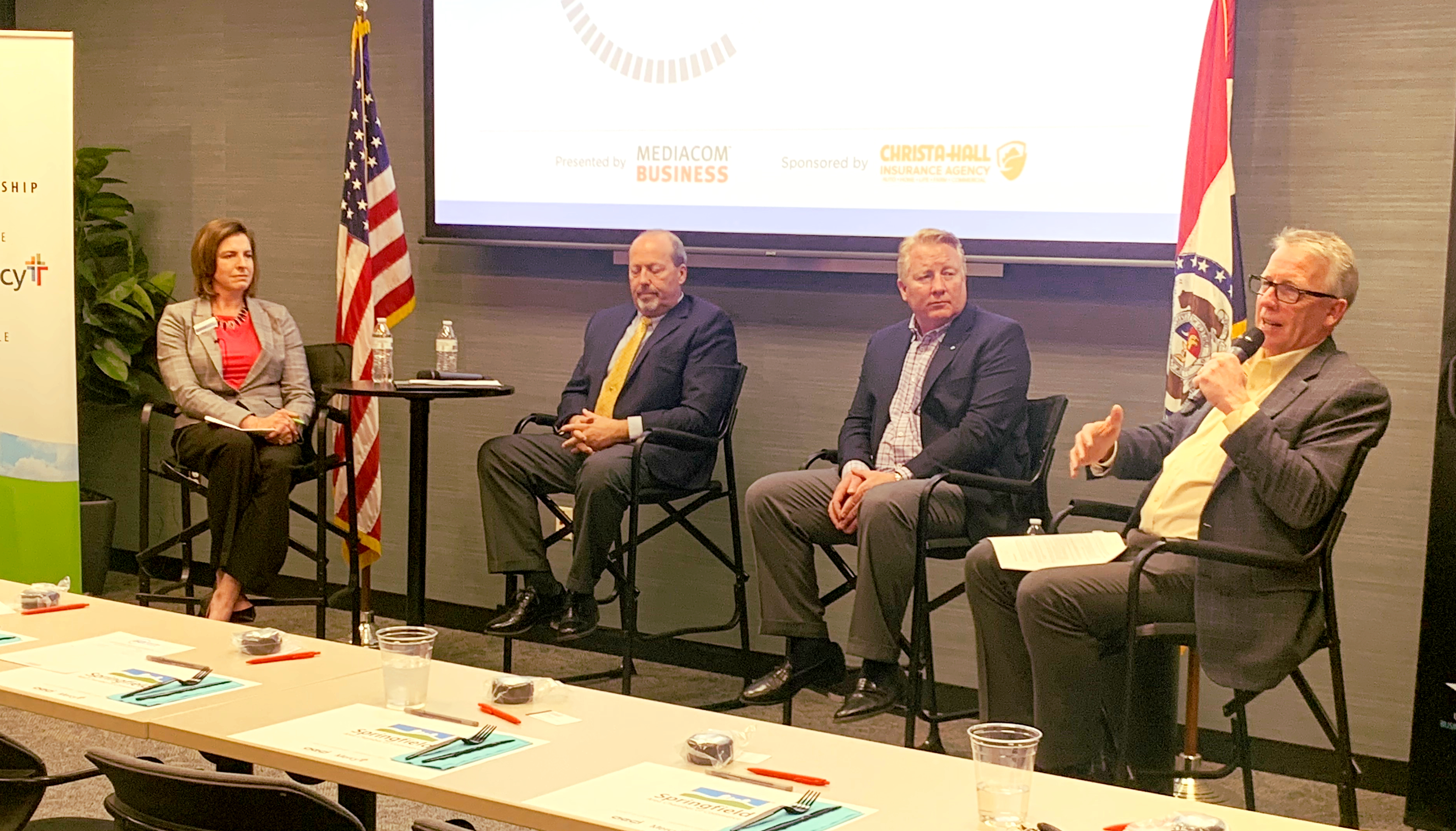Some economists predict a recession is looming. One Springfield economist says it’s likely to kick off later this year.
Dr. Jeffrey Zimmerman, the dean of Drury University’s Breech School of Business, took part in a panel discussion on recession preparation for small business owners at the Springfield Area Chamber of Commerce March 30. Flanked by a commercial real estate expert and an accountant, Zimmerman explained how economic recessions are predicted, and all three gave some advice on how to prepare.
The consensus No. 1 piece of advice is that it’s too early to tell how deep or shallow a 2023 recession might be. The National Bureau of Economic Research (NBER) Business Cycle Dating Committee defines a recession as “a significant decline in economic activity that is spread across the economy and that lasts more than a few months.” The group uses employment rates, consumer spending, industrial production and payroll incomes to determine the overall climb or decline of the United States economy.
“Anybody who is willing to tell you the depth of that recession — I think that they’re mistaken,” Zimmerman said.
Their overall tips for Springfieldians were simple: be prepared, position yourself to carry on in spite of some difficulty, do what you’re the best at, appeal to your core base of customers and keep yourself out of any entangling debts.
Zimmerman described two key indicators that lead him to believe the United States economy will recess sometime in the last three months of 2023. The first is a phenomenon investors call an inverted yield curve, and the second is inflation as it relates to the U.S. job market and the U.S. consumer market.
A yield curve examines the investment rates, or yields, on U.S. Treasury bonds. Usually, investors compare securities with three-month, two-year, five-year, 10-year and 30-year maturities. The rule of thumb is that longer time periods produce higher yields for investors
A yield curve inverts when the yield on short-term investments are more profitable for investors than the long game.
“When the yield curve is inverted, it means short-term rates are lower than long-term rates,” Zimmerman said. “Why does that matter? Well, in terms of a recession, every recession since 1955 has been preceded by an inverse in the yield curve.”
The yield curve inverted in 2022 twice, giving a strong indication of a recession anytime from 6 to 30 months in the future. Zimmerman said there is another big indicator of a pending recession.
“In my world, it’s inflation,” Zimmerman said. “It’s about money chasing goods. If you think about COVID, the amount of money that was dumped in the economy, the amount of government spending that we’re seeing, along with supply chain shortages, the goods and the money are causing inflation.”
The Federal Reserve’s power to influence

Inflation began rising in April 2021, and hit a 40-year high in June 2022. One of the key jobs for the U.S. Federal Reserve System, Zimmerman said, is to curb or cut inflation.
“The Fed tries to take money off the market; how will they do that?” Zimmerman asked, rhetorically.
By raising target interest rates.
“The Fed sets the base rate, and then banks kind of work off that,” Zimmerman said. “So as short-term rates are rising, what’s that doing? That’s increasing mortgage rates, small business loan rates, all kinds of rates out there, which is how it’s going to impact us.”
Zimmerman said the Fed is fighting inflation, which is causing difficulty in the economy. The question is how rigorous the inflation fight will be as it relates to interest rates. The current inflation rate is around 6 percent, but the Fed’s desired target inflation rate is more like 2 percent.
“That means refrigerators, autos, all the kinds of stuff that we finance — people are going to stop purchasing,” Zimmerman said.
Comparing what might happen later in 2023 to the Great Recession of 2008 or the relatively shallow recession of the early 2000s is difficult, if not impossible. Zimmerman said the 2023 economy exhibits some behaviors that don’t compare to those recessions.
“Typically, rates go up, unemployment starts to go up, GDP starts to go down, but we’re not seeing any of that right now,” Zimmerman said. “We’re all seeing a very tight labor market. Consumers appear to be spending. The supply chain is loosening up a little bit.”
There might not be any recession
Some financial forecasters are backing off on using the word “recession” altogether. In spite of some bank collapses in early 2023, the overall U.S. banking system is healthy, according to a second quarter market update from JPMorgan Asset Management.
JPMorgan also reports inflation levels are falling into more manageable territory, which means the Fed may pause on raising interest rates.
When it comes to investing, the JPMorgan report suggests investors should plan beyond 2023. Buying in “confidence troughs,” or times when consumer confidence in the U.S. stock market is low, has historically yielded better long-term returns for investors, compared to buying stocks at times when confidence was high.
“As investors assess positioning in the remainder of the year, it’s important to assess both the remaining risks on the horizon as well as the menu of investment opportunities in the aftermath of last year’s market corrections,” the JPMorgan note reads. “Specifically, investors may do well to lean into some of the cheap areas of the market and remain selective in expensive ones, while positioning towards the opportunities poised to drive long-run returns beyond the cycle.”
Recession and business revenue

Bob Helm has worked in public accounting for more than four decades, and is the owner of Elliott, Robinson and Company CPAs.
“We’re very historically inclined, which is a very dated way of thinking in the business world now because so much of it has to be forward-thinking to survive,” Helm said.
Taking care of money starts with having the best-possible, accurate information about your money.
“The way we advise our clients all the time is, ‘Do you keep good, current financial information? How good is your financial information,’” Helm said. “Oh, I do it in QuickBooks.’ Well, I asked, ‘How good is your current financial information?’ because it’s garbage-in, garbage-out.”
Helm suggested any business leader, especially a business leader who handles finances for their company, “get your house in order,” and make sure to have accurate, up-to-date financial information on their business.
“You have to be prepared, you have to have good information to make decisions by,” Helm said.
Helm recommends anyone in business work to build reserve funds for their company, and prepare as if all sources of income will be cut off. A healthy reserve is enough cash for the business to continue operating for 3-6 months on zero income.
“That keeps your people employed, that keeps the rent paid, the utilities on, it allows you to persevere through the hard time that happens,” Helm said. “You should set your business up to do that as much as you possibly can.”
It’s all easier said than done for businesses that may be struggling, or for start-ups that may be operating off of an initial investment.
“It takes years to do that,” Helm said. “When you get to that point, I like to refer to it as options. It creates options for you.”
Different ways to cut expenses
If the business climate does get tougher in a recession, Helm expects unemployment to rise and for the job market to get more difficult than it is at present, because some companies will scale back their hiring efforts. While people are often the top operating expense for businesses across all industries, Helm said there are other ways to reduce expenses. It starts with having accurate information on a company’s overall operating costs.
“There’s also other ways to cut costs besides just laying people off,” Helm said. “Look at your overhead costs, how can I make a decision to go, ‘We’re not going to do that improvement now,’ we’re going to lower our inventory levels so the cost of carrying inventory is not what it used to be, we can minimize that. There’s lots of other ways to manage your costs.”
Zimmerman said many companies cut marketing budgets at the first sign of trouble, but suggests taking a deeper look at marketing to crucial customers during hard times. Recessions don’t impact all businesses and all industries evenly.
“A recession for me may be very different than a recession for you, so I think it’s really important to sit down and think about, ‘If I have fewer customers walking through the door, how is that going to impact me? How is that going to impact my business? And what can I do about that?’” Zimmerman said.
Recession and real estate
SVN realtor Jeff Childs has worked in the Springfield market for more than 28 years. When he hears the word “recession,” he thinks of 2008, but not everyone who works in the market is old enough to remember 2008. That’s why he suggests industry leaders in businesses of all sizes work to involve some of their younger and less-experienced staff members in business decisions related to the pending recession, so they can gain valuable experience for now and for the future.
“Are we going into a recession? I don’t know,” Childs said. “If we are, what are we going to do about it? I mean, you yourself have to wake up every day and make things happen for your company and for your families.”
Whether it’s a recession or not, state of mind is important for Childs.
“We’re going to go through difficulty no matter what it is, so you might as well try to make the best of each day,” Childs said.
In commercial real estate, Childs said there are still opportunities for investment and development in recession. The overall cost to build a commercial building is about 70 percent higher today than it was five years ago, Childs said. Inventory in Springfield has been down, which keeps the market steady. Childs views vacant buildings as opportunities for property owners and potential tenants to make deals.

